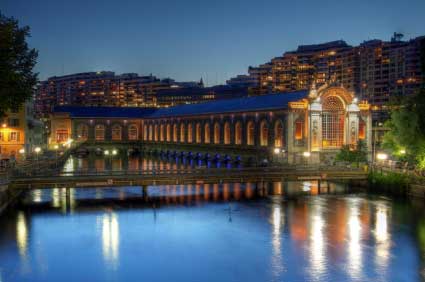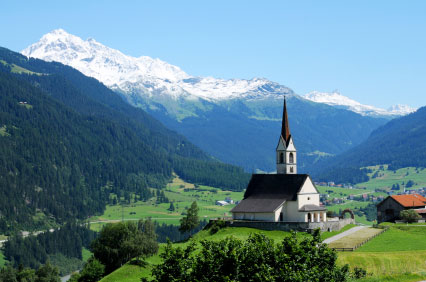Amidst the snowy peaks and scenic landscape of Switzerland lies a powerful economy built on a foundation of inherent native efficiency and skilled expatriate workers. The two main cities of Switzerland are Zurich and Geneva, and it’s within these cities that most business occurs. Both offer a very high quality of life, the potential for big salaries and idyllic surroundings. Problems such as anti-social behaviour and crime are virtually unheard of in Switzerland; in the Economist’s quality of life index Switzerland ranked second on the list, affirming its status as a perfect destination for the working expat to call home.
With so many expats residing in Switzerland it’s no surprise that the mix of people is diverse, with a number of different languages being widely spoken, and English is one of them. The other main languages you will encounter are German, French and Italian. Switzerland adheres to the codes of nature with the weather being very cold and snowy in winter, whilst pleasantly warm with plenty of sun in the summer. The different areas of Switzerland are known as cantons.
Employment, Work Permits and Visas

To legally work in Switzerland you will need a work permit. Recent laws have made it easy for EU citizens to travel to and work within Switzerland, having the following rights: freedom to live and work in the different cantons, freedom to change jobs, freedom to bring family members along with you and the right for them to also seek work.
Switzerland always has a strong demand for skilled expats. Zurich is the financial epicentre of Switzerland and is home to the fourth largest stock market in the world. If you have a financial background perhaps in banking or wealth management then Zurich will be the destination for you. Providing you have desirable skills in these sectors then you will have a wealth of opportunities and the potential to carve out a profitable career.
Finance is also important in Geneva, but mainly it is the land of multinationals. Huge corporations like IBM, Proctor and Gamble, Dell, HP and Gillette, amongst others, all have large bases in Geneva. The best way to secure employment is to find a job before you travel, or if you are fortunate, to be head-hunted by one of the big companies.
Business Culture
Business in Switzerland is generally very formal and conservative. The Swiss can be a closed group of people so having established contacts will aid your cause considerably. Punctuality and organisation are both big points in Switzerland, when arranging a meeting make sure it is done in advance and that you stick to the times stated, lateness is not looked upon kindly. Dress code is smart and stylish, a tailored suit would be ideal. When meeting new colleagues greet them with a firm handshake and address them by their title and surname, in their appropriate language, remembering that Swiss business-people will often speak either French or German. Carry business cards with you at all times to give to people upon first meeting.
The Swiss have little time for small talk and usually prefer to get right down to business, avoid asking personal questions as privacy is also a very valued commodity. Business is done with seriousness and professionalism. There is no room for an ‘office jester’ in Switzerland so refrain from making jokes in the workplace or appearing untowardly relaxed. Working hours in Switzerland tend to be from around 8am till 5pm Monday-Friday.
Accommodation
Most people in Switzerland live in rented accommodation and as an expat you will no doubt do the same. Within Zurich there are 12 different districts with a few neighbourhoods in each. Something to consider is that tax levels may differ from canton to canton depending on what kind of community services will be provided in the area. Due to the high levels of people looking to rent there is often a shortage of apartments available in the city centre or near the businesses and schools. This may lead you to find accommodation slightly out of the main areas. Rental costs are roughly in-line with the rest of western Europe and will of course differ depending on size, location etc.
Something to be aware of is the fact that apartment complexes in Switzerland often have unique sets of rules determining when you are allowed to do laundry and other such errands. You must adhere to these rules strictly or risk the wrath of your new Swiss neighbours.
Transport
Switzerland has an excellent network of public transport in its main cities. The electric rail system is very reliable and efficient and there are buses and trams that run throughout the cities. The actual roads of Switzerland are also of a very high standard and are maintained well allowing easy travel at all times. If you wish to drive an automobile and you already have a drivers license then you will not be required to covert it as long as your stay is limited to 12 months. If you are staying for longer then all you will have to do is apply to have your existing drivers license converted, you will not be asked to take an extra test.

Healthcare
As with most other things in this well maintained country healthcare comes at a high standard of excellence. However, there is no government health service in Switzerland and fees for even a phone consultation can be very expensive. As an expat you must take out a health insurance package within three months of your arrival in Switzerland. Insurance rates differ within the various cantons. Rest assured though that any costs you do incur will be paying for the best quality healthcare. There are numerous healthcare institutes in Zurich and Geneva, including dentists and specialised children’s hospitals. Note that dental care is not usually covered in health insurance packages so a separate dental policy may be necessary. English speaking staff will be on hand to look after you in all the clinics and hospitals. The University Hospital is the largest in Zurich, and its equivalent in Geneva is the HUG
Education
Education and schools in Switzerland are of an extremely high quality. You will have a few options when it comes to finding the right education for your child. Even foreigners living in Switzerland are allowed to send their children to the state schools, which are excellent. However, depending on where you live these schools may teach in either French or German, although if you plan to spend a long time in Switzerland then enrolling your child in such a school would only help them fit into their new surroundings with greater ease. If you feel that your child would benefit from a non-Swiss education then the private international schools are also known for their quality. These international schools offer curriculums from Europe, America and the UK but often come with hefty fees. Examples include the Zurich International School, which caters for ages 2 to 18, and the International School of Geneva for those aged 3 to 18.
Entertainment/Lifestyle
If you enjoy a bit of outdoor fun and don’t mind a bit of cold then Switzerland, the unofficial holy land of winter sports, will have much for you to do in your spare time. Skiing, snowboarding, ice skating and ice hockey are all popular activities. There are also water-parks, spas and health centres as the Swiss put great importance on fitness and well-being. More traditional sports, like football, are also very popular.
It’s not just winter sports and saunas though; there are a host of other exciting activities to help pass the time. In Zurich there are many attractions including the mighty Rhine Falls, the biggest waterfall in Europe. Rhine Falls is located in the area of Schaffhausen and is below a grand castle that hosts a fireworks display on the first of August, Swiss National Day, every year.
Animal lovers will enjoy a visit to Zurich Zoo, a fantastic zoo with over 260 species, and some rare and endangered animals that you would be hard pressed to find anywhere else including a red panda and the magnificent snow leopard. Zurich Zoo has taken great care to ensure the wellbeing of its animals and has re-created many unique ecosystems for them, such as the Ethiopian Highlands and the ranges of Madagascar.
Art connoisseurs have the Fine Arts Museum of Zurich to wonder at. It has a fantastic collection featuring works from artistic luminaries the likes of Edvard Munch, Picasso, Monet, Rothko and many more.

If you just want to have a relaxing stroll or a coffee then venture to the area of Niederdorf, the proverbial heart of Zurich. Here you will find a heap of quaint cafes, little bookstores, fashionable boutiques and other uniquely Swiss shops and eateries.
If you will be staying in Geneva then you will find an equal amount of activities and attractions. The Jet d’Eau is a huge water fountain, the tallest in the world, which shoots water 140m into the air at 124mph. At night the fountain is lit up making it even more pleasing to the eye.
For architectural wonder visit St Pauls Cathedral or the United Nations building- complete with free-roaming peacocks. Lake Geneva is one of the prime spots and attracts thousands of visitors from around the world.
To learn more about becoming an expat in Switzerland visit The Swiss Embassy website, which can be found at: http://switzerland.embassyhomepage.com/

